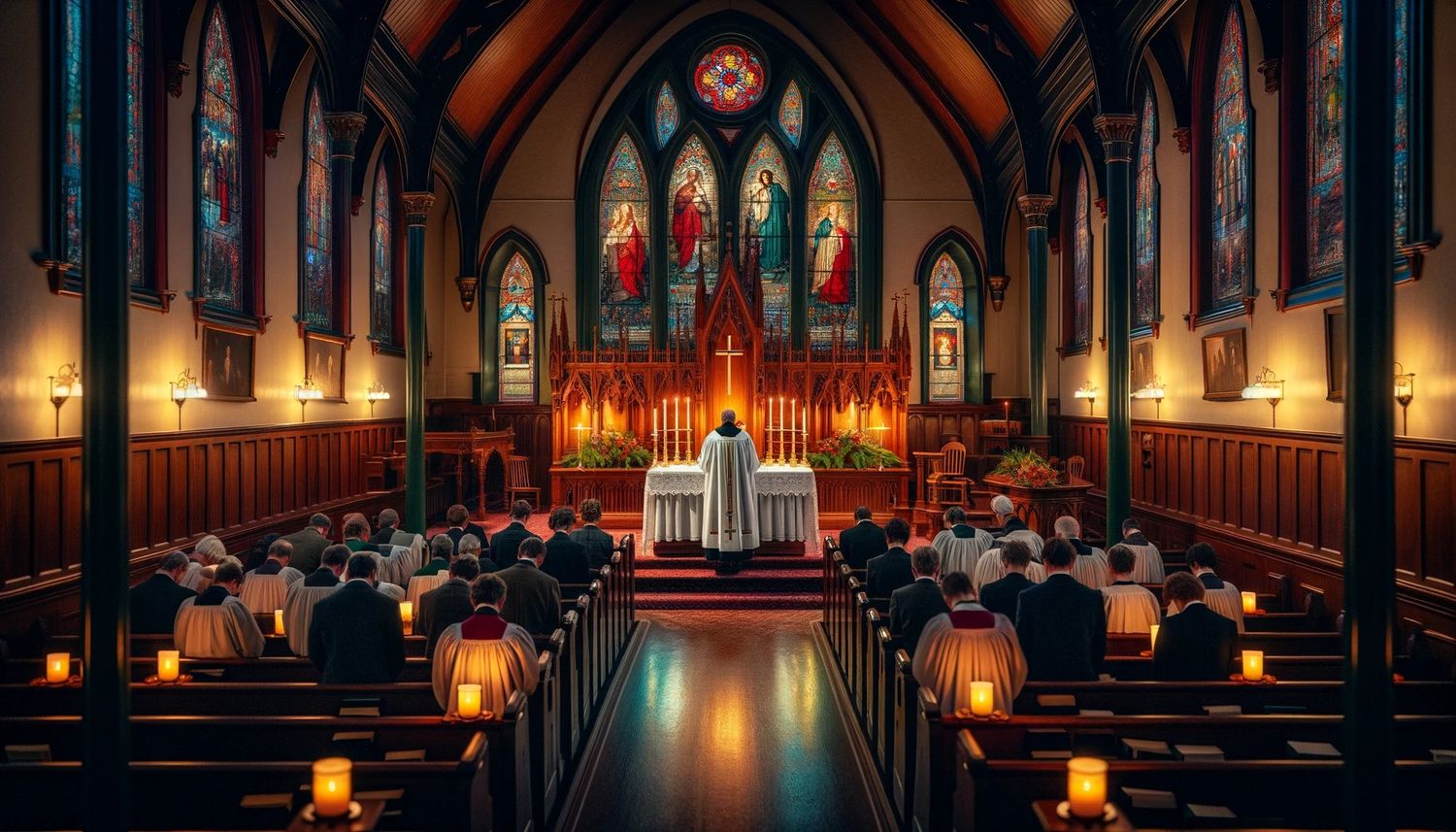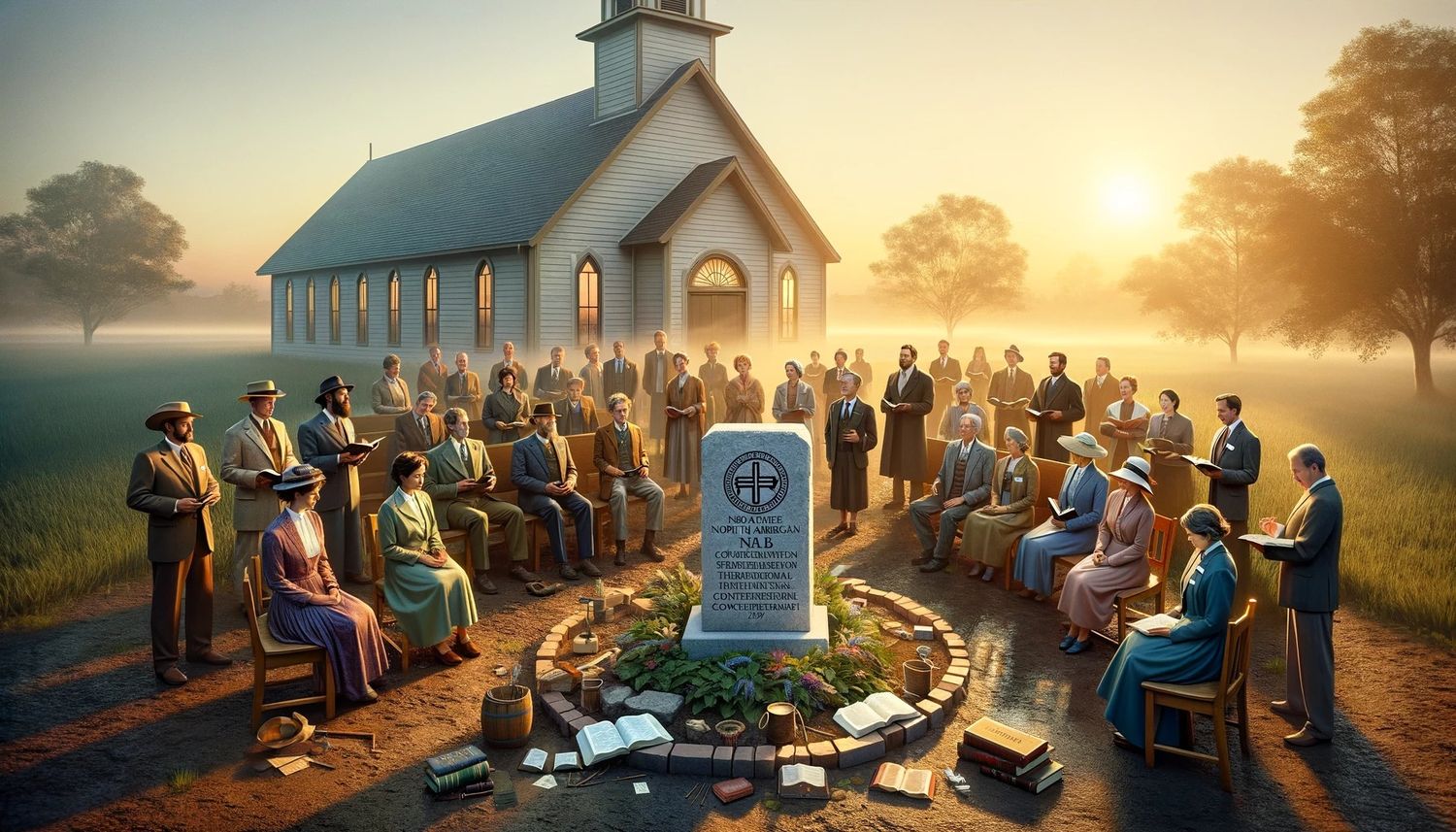Home>Theology and Spirituality>What Is The Lutheran Church’s Position On Homosexuality


Theology and Spirituality
What Is The Lutheran Church’s Position On Homosexuality
Published: March 3, 2024
Jason DeRose, Managing Editor at Christian.net, uses his expertise in religion and journalism to deepen understanding of faith's societal impacts. His editorial leadership, coupled with a strong academic background, enriches the platform’s diverse content, earning him recognition in both journalism and religious circles.
Discover the Lutheran Church's stance on homosexuality and explore its theological and spiritual perspectives. Gain insight into the intersection of faith and LGBTQ+ issues.
(Many of the links in this article redirect to a specific reviewed product. Your purchase of these products through affiliate links helps to generate commission for Christian.net, at no extra cost. Learn more)
Table of Contents
- Introduction
- Historical Perspective on Homosexuality in the Lutheran Church
- Theological Basis for the Lutheran Church's Position on Homosexuality
- Current Stance and Policies of the Lutheran Church on Homosexuality
- Controversies and Debates within the Lutheran Church Regarding Homosexuality
- Impact of the Lutheran Church's Position on Homosexuality on LGBTQ+ Members
- Conclusion and Future Outlook
Introduction
The Lutheran Church's position on homosexuality is a topic that has sparked significant debate and discussion within the church and beyond. The question of whether the Lutheran Church accepts or rejects homosexuality has been a point of contention for many years. In this article, we will delve into the historical perspective, theological basis, current stance, controversies, and impact of the Lutheran Church's position on homosexuality. Understanding the complexities of this issue is crucial for gaining insight into the church's approach to LGBTQ+ individuals and the ongoing dialogue within the Lutheran community.
Read more: What Is The Lutheran Church
Historical Perspective on Homosexuality in the Lutheran Church
-
Early Views: In the early years of the Lutheran Church, attitudes towards homosexuality mirrored those of wider society, which often viewed same-sex relationships as sinful or deviant. The church's stance was influenced by prevailing cultural and religious norms, leading to a general disapproval of homosexuality.
-
Shifts in Understanding: Over time, the Lutheran Church, like many other Christian denominations, has experienced shifts in its understanding of human sexuality. As societal attitudes evolved and individuals began to challenge traditional interpretations of biblical passages related to homosexuality, the church also engaged in reevaluating its stance.
-
Theological Reflection: The Lutheran Church's historical perspective on homosexuality has been shaped by theological reflection and interpretation of scripture. This process has involved grappling with complex biblical texts and discerning their relevance to contemporary understandings of human sexuality.
-
Influence of Reformation Principles: The Lutheran Church's historical perspective on homosexuality has also been influenced by the principles of the Reformation, including the emphasis on the priesthood of all believers and the authority of scripture. These foundational tenets have played a role in shaping the church's approach to addressing issues related to human sexuality.
-
Diversity of Views: It is important to note that the historical perspective on homosexuality within the Lutheran Church has not been monolithic. There have been diverse viewpoints and interpretations among theologians, clergy, and congregants, reflecting the complexity of the issue within the context of the church's history.
Understanding the historical perspective on homosexuality in the Lutheran Church provides valuable context for examining the evolution of the church's position on this topic and the ongoing dialogue within the faith community.
Theological Basis for the Lutheran Church's Position on Homosexuality
-
Scriptural Interpretation: The theological basis for the Lutheran Church's position on homosexuality is deeply rooted in the interpretation of scripture. Central to this interpretation is the examination of biblical passages that address same-sex relationships, such as those found in the books of Leviticus, Romans, and Corinthians. The church engages in rigorous theological study and reflection to discern the meaning and relevance of these passages within the broader context of the Christian faith.
-
Traditional Marriage: Within the Lutheran theological framework, the institution of traditional marriage is upheld as a sacred covenant, reflecting the union between Christ and the Church. This understanding of marriage as a divine institution has informed the church's approach to human sexuality, including its stance on homosexuality. The theological basis emphasizes the significance of marriage as a union between a man and a woman, which has implications for the church's view on same-sex relationships.
-
Natural Law and Order: The Lutheran Church's theological position on homosexuality is also influenced by the concept of natural law, which asserts that certain moral principles are inherent in the natural order. This theological perspective underscores the belief that God's design for human sexuality is reflected in the complementarity of male and female, and that deviations from this natural order are viewed as contrary to God's intended plan for creation.
-
Ethical Discernment: Ethical discernment, guided by Lutheran theological principles, plays a crucial role in shaping the church's position on homosexuality. The Lutheran tradition emphasizes the importance of ethical reflection, taking into account the complexities of human experience and the ethical implications of various human behaviors. This discernment process involves engaging with diverse theological perspectives and ethical considerations related to human sexuality and relationships.
-
Continual Dialogue and Reflection: The theological basis for the Lutheran Church's position on homosexuality is not static, but rather involves continual dialogue, reflection, and discernment within the faith community. The church engages in theological conversations that seek to integrate scriptural interpretation, ethical discernment, and the lived experiences of LGBTQ+ individuals, recognizing the need for ongoing theological exploration and understanding.
Understanding the theological basis for the Lutheran Church's position on homosexuality provides insight into the complex interplay of scriptural interpretation, theological principles, and ethical discernment within the context of the church's engagement with issues of human sexuality.
Current Stance and Policies of the Lutheran Church on Homosexuality
-
Inclusivity and Affirmation: The current stance of the Lutheran Church on homosexuality reflects a spectrum of perspectives within the denomination. While some branches of the Lutheran Church have embraced a more inclusive and affirming approach towards LGBTQ+ individuals, others maintain traditional teachings on human sexuality. This diversity of perspectives has led to varying policies and practices across different synods and congregations within the Lutheran tradition.
-
Ordination and Marriage: Within the Lutheran Church in the United States, there have been significant developments regarding the ordination of LGBTQ+ clergy and the recognition of same-sex marriages. Some synods have adopted policies that allow for the ordination of openly LGBTQ+ individuals, as well as the blessing of same-sex unions or marriages. These policies reflect a commitment to affirming the gifts and callings of LGBTQ+ individuals within the life of the church.
-
Denominational Statements and Resolutions: The Evangelical Lutheran Church in America (ELCA), the largest Lutheran denomination in the United States, has engaged in extensive discernment and dialogue on issues related to human sexuality. In 2009, the ELCA adopted a social statement on human sexuality, which acknowledged a range of perspectives on homosexuality within the church. This statement affirmed the commitment to welcome and include LGBTQ+ individuals in the life of the church while recognizing the diversity of beliefs within the denomination.
-
Pastoral Care and Support: Many Lutheran congregations and clergy members have been actively involved in providing pastoral care and support to LGBTQ+ individuals and their families. This includes creating welcoming and inclusive spaces for LGBTQ+ members, offering resources for education and dialogue on LGBTQ+ issues, and advocating for the full inclusion of LGBTQ+ individuals in the life of the church.
-
Continual Discernment and Dialogue: The current stance and policies of the Lutheran Church on homosexuality are characterized by ongoing discernment and dialogue. The denomination continues to engage in theological reflection, ethical discernment, and pastoral care related to LGBTQ+ issues, recognizing the need for continued conversation and understanding within the faith community.
Understanding the current stance and policies of the Lutheran Church on homosexuality provides insight into the dynamic and evolving nature of the denomination's engagement with LGBTQ+ individuals and the ongoing dialogue within the faith community.
Controversies and Debates within the Lutheran Church Regarding Homosexuality
-
Scriptural Interpretation: One of the central controversies within the Lutheran Church regarding homosexuality revolves around differing interpretations of biblical passages related to same-sex relationships. While some theologians and congregants advocate for a more inclusive interpretation that affirms LGBTQ+ individuals, others uphold traditional understandings of scripture that view homosexuality as incompatible with Christian teachings. This diversity of perspectives has led to ongoing debates and theological disagreements within the denomination.
-
Denominational Policies: The varying policies and practices across different synods and congregations within the Lutheran tradition have been a source of controversy and debate. Some synods have adopted more progressive stances, allowing for the ordination of LGBTQ+ clergy and the recognition of same-sex marriages, while others maintain traditional teachings on human sexuality. These differences in denominational policies have contributed to internal tensions and debates regarding the church's official position on homosexuality.
-
Theological Discernment: The process of theological discernment within the Lutheran Church has been a point of contention in discussions about homosexuality. The denomination grapples with the challenge of integrating diverse theological perspectives and ethical considerations related to human sexuality. This ongoing discernment has sparked debates about the authority of scripture, the role of tradition, and the relevance of cultural context in shaping the church's stance on LGBTQ+ issues.
-
Pastoral Care and Inclusivity: Controversies within the Lutheran Church regarding homosexuality also center on pastoral care and inclusivity for LGBTQ+ individuals. While some congregations and clergy members have actively advocated for the full inclusion and affirmation of LGBTQ+ members, others have expressed concerns about the theological implications of such inclusivity. These debates have raised questions about the balance between pastoral care and theological fidelity within the context of LGBTQ+ issues.
-
Impact on Church Unity: The controversies and debates within the Lutheran Church regarding homosexuality have had implications for church unity and fellowship. The diversity of perspectives on LGBTQ+ issues has at times strained the unity of the denomination, leading to tensions and disagreements among congregations, clergy, and members. The ongoing dialogue and discernment on this topic reflect the denomination's commitment to addressing internal controversies while seeking to maintain a sense of unity and mutual respect.
Understanding the controversies and debates within the Lutheran Church regarding homosexuality provides insight into the complex and multifaceted nature of the denomination's engagement with LGBTQ+ issues and the ongoing theological dialogue within the faith community.
Read more: What Are The Lutheran Church Beliefs
Impact of the Lutheran Church's Position on Homosexuality on LGBTQ+ Members
The Lutheran Church's position on homosexuality has had a profound impact on LGBTQ+ members within the denomination, shaping their experiences, sense of belonging, and spiritual well-being. The impact of the church's stance on homosexuality extends across various dimensions, influencing the lives of LGBTQ+ individuals within the faith community.
-
Spiritual and Emotional Well-being: The church's position on homosexuality has significantly affected the spiritual and emotional well-being of LGBTQ+ members. For those who identify as LGBTQ+, the church's stance can have profound implications for their sense of acceptance and affirmation within their faith community. LGBTQ+ individuals may experience emotional distress, feelings of alienation, and spiritual struggle as they navigate the tension between their sexual orientation or gender identity and the church's teachings.
-
Sense of Belonging and Inclusion: The church's position on homosexuality has shaped LGBTQ+ members' sense of belonging and inclusion within congregational life. Depending on the denomination's policies and practices, LGBTQ+ individuals may encounter varying degrees of acceptance and affirmation within their local congregations. The church's stance can impact LGBTQ+ members' participation in worship, leadership roles, and community engagement, influencing their overall sense of belonging within the faith community.
-
Family and Social Relationships: The church's position on homosexuality can also impact LGBTQ+ members' family and social relationships. LGBTQ+ individuals may experience tension and conflict within their families or social circles, particularly if there are differing views on homosexuality within the church. The church's stance may influence the level of support, acceptance, or rejection that LGBTQ+ individuals encounter from their religious and social networks, shaping their broader social experiences.
-
Psychological and Mental Health: The church's position on homosexuality can have implications for the psychological and mental health of LGBTQ+ members. Negative messaging or stigmatizing attitudes towards LGBTQ+ individuals within the church can contribute to mental health challenges such as depression, anxiety, and internalized stigma. Conversely, affirming and inclusive attitudes within the faith community can positively impact LGBTQ+ members' psychological well-being and resilience.
-
Advocacy and Activism: The church's position on homosexuality has also influenced LGBTQ+ members' engagement in advocacy and activism within the denomination. LGBTQ+ individuals may advocate for greater inclusion, affirmation, and understanding of diverse sexual orientations and gender identities within the church. The church's stance can shape the nature and extent of LGBTQ+ members' involvement in efforts to promote equality and justice within the faith community.
Understanding the impact of the Lutheran Church's position on homosexuality on LGBTQ+ members is essential for recognizing the complexities of LGBTQ+ individuals' experiences within the faith community and the ongoing dialogue surrounding LGBTQ+ inclusion and affirmation.
Conclusion and Future Outlook
The ongoing dialogue and discernment within the Lutheran Church regarding homosexuality reflect the denomination's commitment to addressing internal controversies while seeking to maintain a sense of unity and mutual respect. Looking ahead, the future outlook for the Lutheran Church's engagement with LGBTQ+ issues involves continued theological reflection, ethical discernment, and pastoral care. The denomination is likely to grapple with the complexities of integrating diverse theological perspectives and ethical considerations related to human sexuality, recognizing the need for ongoing dialogue and understanding within the faith community. The future may also see further developments in denominational policies and practices, as different synods and congregations navigate the tension between traditional teachings on homosexuality and the call for greater inclusivity and affirmation of LGBTQ+ individuals. Additionally, the Lutheran Church may continue to play a role in broader societal conversations about LGBTQ+ rights and equality, contributing to the ongoing evolution of attitudes towards human sexuality within the church and beyond. Ultimately, the future outlook for the Lutheran Church's position on homosexuality involves a dynamic and evolving engagement with LGBTQ+ issues, shaped by theological reflection, pastoral care, and the diverse voices within the faith community.














